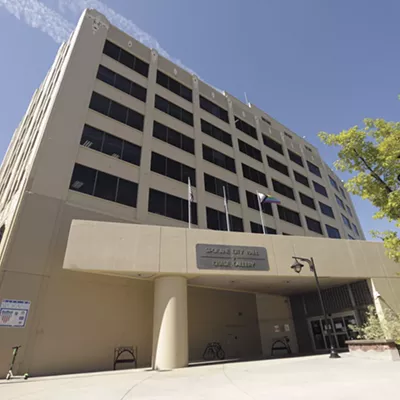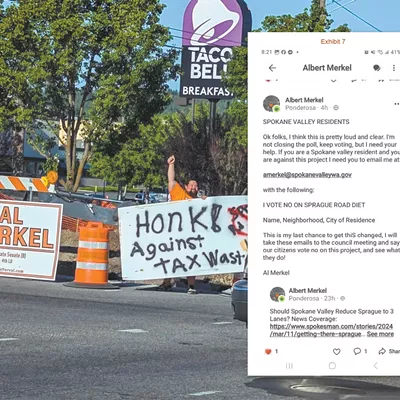
In an interview with the Inlander, held before his narrow election to City Council president, Councilman Breean Beggs stressed that his penchant for compromise sometimes meant that he was willing to wait for agreement instead of shoving through an ordinance that only makes one side happy. And as one example, he cited the meetings between landlords and tenants groups over the past two years, hoping to forge an agreement over new tenant protections.
"They're so passionate," Beggs says. "They're so committed."
Yet he hadn't been able to figure out that "sweet-spot" of compromise.
Still, after the election, he said, he'd likely pass some "low-hanging fruit," the stuff that almost everyone could get behind. It would be a package of compromise reforms that he suggested "landlords would be fine with" and the tenants "would like."
Indeed, late last month, Beggs, outgoing Council President Ben Stuckart and Councilwoman Kate Burke proposed a slew of reforms intended to protect tenants, including banning most no-cause evictions and requiring landlords to assist some low-income tenants with rental relocation assistance.
But the landlords weren't fine with it: As soon as the language of the ordinances was announced, landlords and Realtors began rallying their allies to show up to the Dec. 9 council meeting when a vote on the ordinance was scheduled.
Washington Association of Realtors Vice President Tom Hormel warned on Facebook that the ordinance would backfire, making "some landlords sell and others raise rents to offset the risk."
Ultimately, Beggs, Stuckart and Burke couldn't even get any of the other council members to support the current proposals. So on Monday afternoon, every council member but Burke voted to delay the vote for three more months.
"There is a housing crisis," Stuckart stressed to his fellow council members on Monday. "Rents are rising at over 20 percent per year in Spokane. The market is clearly not working. So sometimes you then have to put protections in place. I urge you not to use this time up until March 1 to just delay this and do nothing."
To be sure, it's tough to be a low-income tenant right now in Spokane. For years, the supply of apartments in the city has struggled to keep up with demand. And with a crowd of tenants desperate to snatch up any apartment available, many landlords have responded by either raising their rents or their standards for the type of people they would like to rent to. For many renters, an eviction can mean homelessness.
Under Beggs' ordinance, landlords would need to provide tenants 90 days heads up before increasing rent. Refundable damage deposits would be limited to the equivalent of one month's rent. Landlords would have to take out a business license, pay for independent inspections of new housing and pay an annual $10 to the city for each housing unit.
Most controversially, it would require that, whenever they raise rents by 5 percent or more, landlords would need to offer rental relocation assistance — $2,000, plus their damage deposit — to "cost-burdened" tenants who want to relocate as a result. (The ordinance defines "cost-burdened" as anyone paying at least 30 percent of their income in rent.)
But Steve Corker, president of the Landlord Association of the Inland Northwest, worries that the proposed ordinance could harm the very same small landlord businesses who are the most willing to work with tenants who struggle to pay their rent.
"The small landlords that often provide the most flexible and affordable housing are disappearing from the market," Corker says.
Complicating matters, Beggs says, was a related ordinance from Stuckart that would limit evictions even further, only allowing eviction for a handful of reasons, such as a tenant's failure to pay rent, the property owner's desire to rehab the unit or live in the unit themselves.
Beggs says that Stuckart wanted to get his ordinance passed while he was still on council, but having both measures on the docket at the same time "aggravated the issue somewhat."
And while Councilwoman Burke stressed that the council had been debating this issue for nearly two years, other council members, like Karen Stratton and Lori Kinnear, shared some of the landlords' concerns and frustrations with the process.
Councilwoman Candace Mumm, who owns a small real estate company with income from three properties herself, argues it's better to have the state Legislature, instead of local city councils, solve this issue.
"My preference is that we should address these kinds of issues on a statewide level," Mumm says.
Tenants Union of Washington Co-Executive Director Terri Anderson, meanwhile, portrayed the delay in an email to council as "unfair, unnecessary and cruel."
"Why do only landlord voices matter to City Council?" Anderson wrote. "The imbalance of power is now made worse."
Beggs is OK with the delay. But he also argues that the system is "totally broken right now" and something needs to be done.
"People are just scared to death of when their lease is up, what's going to happen," Beggs says. ♦























